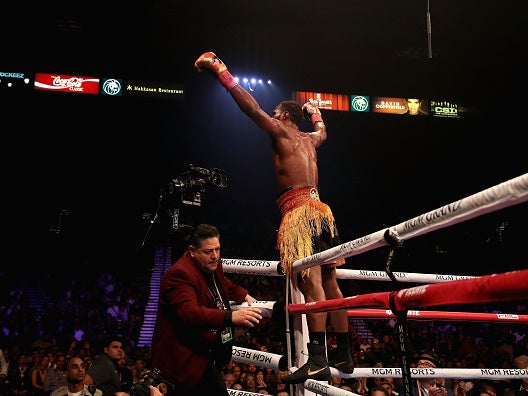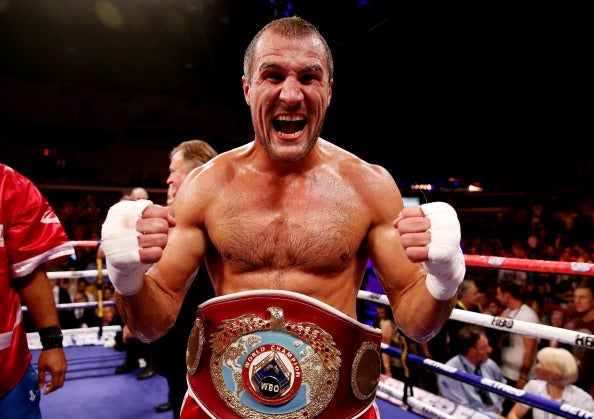Should boxing continue to reward convicted criminals like Marcus Browne and Adrien Broner?
In boxing, crime has often been fetishised, with an infatuation over who is the baddest. But, asks Tom Kershaw, where should we draw when those consequences spill into real life?


Marcus Browne, 192lbs, a hulking torso set upon stiltish legs, is commanding centre-ring with a sneer.
A five-inch gash has opened up on the New York native’s opponent after a gruesome head clash in the seventh round, and it’s no exaggeration to say blood is dripping from Badou Jack’s face like water from a gutter.
The US’ Showtime commentary team howl over Jack’s bravery, “ooh” and “aahh” about Browne’s strength; two gladiators cast in sequinned trunks, almost inhuman in their aura.
It’s the co-main event of Manny Pacquiao’s US return against Adrien Broner and, spilling well over schedule, millions have inadvertently found themselves tuning in to the latter half of Browne’s runway to a world title.
As it becomes clear the American will be victorious, the analysts recall his amateur achievements – a former US National Amateur champion, two-time Golden Gloves champion and a 2012 Olympian – but overlooked amongst it all is something accepted yet unspoken, left ignored like an ugly secret.
Little over three months before the bout, Browne was sitting in a Staten Island police cell. The 28-year-old had been arrested for violating a restraining order and is alleged to have kicked a hole in his former girlfriend’s front door, choked her and taken away her phone as she attempted to call the police – he denies the charges.
Next week, just 10 days after the bout, he will appear in court. It was his third arrest for alleged domestic violence against the mother of his daughter within ten months.
Yet, as Browne beat his opponent – nicknamed after prostitute killer Jack The Ripper – in front of once jailed domestic abuser Floyd Mayweather to win an interim world title, he earned $250,000 in the process.
The glaring question, from a moral standpoint, is how can this be allowed? In the vast majority of other sports, the individual would be an outcast – even if cynically for the sake of commercial image and brand. Yet, in boxing, the line between reason and regret is rarely drawn.
There has always been a fetishisation of crime in the sport, long before mob connections and Mike Tyson’s rape conviction. A quick Google search reveals innumerable top ten rankings of ‘boxing’s baddest criminals’ and the ‘meanest men alive’. We, the public, have always been fascinated by the man unhinged beyond the public face and embraced the darkest sides of these detached idols.

In Browne’s 175lbs division, former kingpin Sergey Kovalev was arrested last year for allegedly punching a woman in the face in Big Bear, California, breaking her nose and displacing a disk in her neck – he too denies the charges. Former World Boxing Council champion Adonis Stevenson served 18 months in prison for pimping two girls in his youth.
Boxing has never claimed to be upheld by morality. There are no laws preventing these men from competing. But surely there is a responsibility to prevent men guilty of severe – often violent – crimes from profiting in the sport?
Everybody should be allowed a chance to prove they have changed. After all, Anthony Joshua was once convicted of drug possession during his amateur days and now, a decade on, stands as a definitive role model to a generation of British teenagers.
British hall-of-fame promoter Frank Warren penned a column in The Independent in 2015 detailing how the likes of Martin Murray – a recently retired and beloved world title challenger from St Helens, who served a prison sentence for assault and robbery – prove why fighters with criminal convictions deserve a second chance.
“When those involved have shown lessons have been learnt they should be allowed to put it behind them and get on with their jobs,” Warren wrote. “When fighters have been back on the straight and narrow for some time, surely the only ‘form’ that matters is not a criminal record, but that acquired in legitimate combat?”
But when the likes of Browne are being celebrated on national television after a second chance has already sailed, is something not plainly wrong? In his next fight, he may earn upwards of $1m and become a global star. Another bad-boy, a cartoon villain, so in tune with the script that the very real consequences outside the ring are forgotten.
Once Browne had departed the MGM Grand on Sunday, the arena broke into a frenzy as Manny Pacquiao danced his way towards the ring. The 40-year-old’s opponent, Adrien Broner, has served multiple prison sentences and been convicted on a count of armed robbery and sexual battery.
After losing, he would threaten to beat up a journalist, conjuring viral headlines, soundbites, memes and all manner of the internet’s usual dietary offerings. Then everyone logged off, and Broner, mightily rewarded, remains one of boxing’s biggest draws.
We can never be in full knowledge of extenuating circumstances around individuals, nor have the ability to truly comprehend reason or reckoning from the outside. No one person has the right to rule on whether someone should be able to compete in spite of a criminal past, but what then when it seems impossible to argue how we should not?
Join our commenting forum
Join thought-provoking conversations, follow other Independent readers and see their replies
0Comments